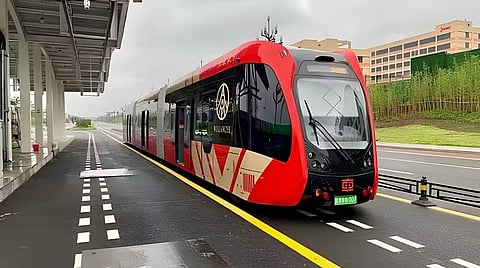Pakistan welcomes its first trackless metro, find out more
Electric metro to make debuts in Lahore as part of Punjab’s solar-powered transit overhaul

Dubai: Pakistan is all set to have its first trackless, ticketless solar powered metro.
In a major step toward modernising urban transport, Lahore has received its first demonstration vehicle of the Super Autonomous Rail Rapid Transit (SRT) System. This is called a cutting-edge “trackless metro” that operates like a subway but on roads.
Billed as a “subway on wheels,” the SRT system uses Virtual Track Technology, relying on advanced sensors, GPS, and digital mapping instead of physical rails. The battery-powered, fully electric vehicle is part of a pilot project initiated to evaluate the system’s potential in transforming city travel in Pakistan.
Trial run
The trial run has already begun near the Lahore Airport; a controlled corridor selected for early-stage testing. Officials from both Pakistan and China, the system’s country of origin, attended the launch, which marks a first-of-its-kind demonstration in South Asia.
“This is not just a test drive. This is a test for the future of public transport in Punjab,” said an official from the provincial transport department.
5-year transport master plan
The arrival of the trackless metro aligns with Punjab Chief Minister Maryam Nawaz’s newly approved five-year transport master plan, which aims to deploy an Automated Rapid Transport (ART) system in 30 cities across the province.
“This will be a fully solar-powered, smart transit solution for modern Punjab. We’re not just building infrastructure; we’re building equity in mobility,” Maryam stated during a recent briefing.
No costly tracks
The ART system will use vehicles similar to the SRT, electric, multi-coach buses capable of carrying 250 to 300 passengers each. Unlike traditional metros or BRT systems, the SRT/ART models require no costly tracks or elevated corridors, enabling faster, cheaper roll-out across both large cities and smaller urban centres.
First Phase: Lahore, Faisalabad, Gujranwala
In the first roll-out phase of the ART/SRT system, services will begin in Lahore, Faisalabad, and Gujranwala, with future phases expanding to a total of 30 cities over the next four years. Each phase is expected to cover 10 cities.
Social impact
Beyond technology, the trackless metro offers a major boost to climate and urban equity goals. With each vehicle potentially replacing up to 100 cars, the system is expected to significantly reduce air pollution, noise, and traffic congestion.
“Every city deserves a modern transport system. This initiative will bridge urban disparities and improve quality of life for millions,” added Maryam.
Formal operations
The Lahore test trial will continue in the coming weeks, with engineers collecting performance data and user feedback. If the trial is successful, formal operations could begin as early as 2026, followed by expansion to other major urban centres including Karachi, Islamabad, and Rawalpindi.
The SRT combines the benefits of a tram and the flexibility of a bus. It is guided by a virtual rail system, giving it the precision of a train while allowing it to run on standard roads. This makes it a strong candidate for congested, infrastructure-strained cities like Lahore.
Key features
No need for rails or elevated tracks
Zero-emission, fully electric operation
Smart driver-assist and navigation systems
Fast-charging at solar-powered smart stations
On-board amenities like Wi-Fi and CCTV surveillance
Sign up for the Daily Briefing
Get the latest news and updates straight to your inbox



